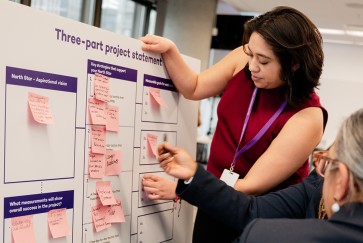Northwestern University has announced the recipients of the Peter G. Peterson Foundation Pandemic Response Policy Research Fund, an initiative launched in April to evaluate policies and actions during the current pandemic and to advance effective recommendations for the future.
The effort was made possible by a $1 million grant from the Peterson Foundation, a non-partisan organization that promotes fiscal and economic sustainability and increases public awareness of key fiscal challenges.
Eight faculty members from five Northwestern schools have received funding, following evaluation by a University review committee. The recipients, their primary department affiliation, and project title are:
- Tabitha Bonilla, Human Development and Social Policy: “COVID-19, Identity, and Institutional Trust”
- Jennifer Chan, Emergency Medicine: “Improving the Usability and Value of Human Mobility Data for Future Pandemic Disasters”
- Anthony DeFusco, Finance: “Emergency Housing Assistance and Financial Stability: Evidence from the Los Angeles COVID-19 Rent Relief Lottery”
- James Druckman, Political Science: “Tracking U.S. Response to COVID-19: Trust, Information Acquisition, and Inequalities”
- Charles Nathanson, Finance: “The Effect of Commercial Mortgage Financing on Business Performance During the COVID Pandemic”
- Terri Sabol and Diane Schanzenbach, both Human Development and Social Policy: “Effects of COVID on the Early Care and Education Market in Chicago”
- Nathan Walter, Communication Studies: “Communication Ecology: Using a New Method to Guide Health Policies in an Information-Rich Environment
- Dashun Wang, Management and Organizations: “Developing a Quantitative Framework to Track and Assess State-Level Policy Responses to the COVID-19 Pandemic”
Projects were selected based on their potential to increase knowledge of the societal impact of the COVID-19 pandemic and develop action-oriented solutions to prepare for future pandemics and crises. The 18- to 24-month research projects will also address near-term policy relevance for the U.S. economic and fiscal outlook, including the performance of the U.S. healthcare system — core elements of the Peterson Foundation’s mission.
Projects were selected based on their potential to increase knowledge of the societal impact of the COVID-19 pandemic and develop action-oriented solutions to prepare for future pandemics and crises.
For example, Chan’s project looks to improve future pandemic preparedness by investigating how public health practitioners, response planners, and researchers have used human mobility data during the COVID-19 crisis. Druckman’s project will build on research the Weinberg College of Arts and Sciences professor has conducted as part of the ongoing COVID States Project, a large-scale data collection effort that aims to “identify links between social behaviors and virus transmission as well as the impact of messaging and regulation on individual and community outcomes” during the COVID-19 crisis.
Learn more about all the funded projects.
Schanzenbach, who is director of Northwestern’s interdisciplinary Institute for Policy Research and one of the faculty members who reviewed nearly two dozen proposals for consideration, was pleased with the diversity of investigations put forward. “We had a wide range of excellent proposals from scholars across the University from different fields,” she said. “We are very excited about the potential for those selected to help us understand the ongoing effects of COVID-19 and to design policy solutions.”
Janice Eberly, the James R. and Helen D. Russell Professor of Finance at the Kellogg School of Management, was also a member of the review team and echoed the potential of the new research. “The Peterson Foundation offers a unique opportunity to elevate timely and policy-relevant research across Northwestern,” said Eberly. “The projects bring our best thinking and analytics to bear on the pandemic’s incredible challenges for health care, economics, and the social safety net – and suggest how policy can make a difference in responding to future crises.”
Michael A. Peterson, CEO of the Peterson Foundation said: “This innovative research project will help illuminate critical areas for improvement and preparedness as we emerge from the pandemic. This timely research by Northwestern’s stellar faculty will offer lessons and solutions to improve public health and policymaking at the state, federal and local levels, to help save lives and improve our response to future crises.”
Additional information about the Peterson Fund, including the application request and deadlines for Round 2 project funding, which is anticipated in October, is available online.
The Peterson Foundation grant counts toward We Will. The Campaign for Northwestern.
The funds raised through the “We Will” Campaign are helping realize the transformational vision set forth in Northwestern’s strategic plan and solidifying the University’s position among the world’s leading research universities.
More information on We Will. The Campaign for Northwestern is available at wewill.northwestern.edu.
Matt Golosinski is director of communications in the Office for Research.


